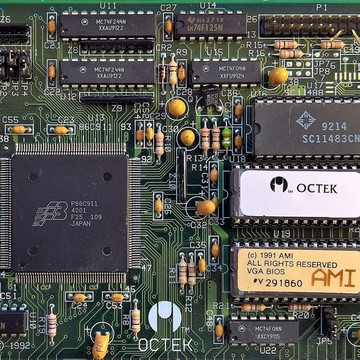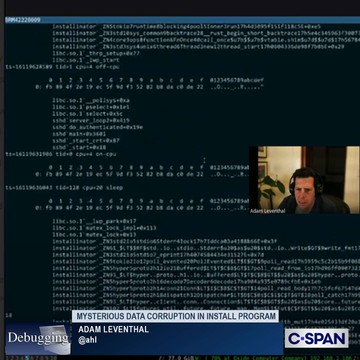

Oxide and Friends
Oxide Computer Company
Oxide hosts a weekly Discord show where we discuss a wide range of topics: computer history, startups, Oxide hardware bringup, and other topics du jour. These are the recordings in podcast form.
Join us live (usually Mondays at 5pm PT) https://discord.gg/gcQxNHAKCB
Subscribe to our calendar: https://calendar.google.com/calendar/ical/c_318925f4185aa71c4524d0d6127f31058c9e21f29f017d48a0fca6f564969cd0%40group.calendar.google.com/public/basic.ics
Join us live (usually Mondays at 5pm PT) https://discord.gg/gcQxNHAKCB
Subscribe to our calendar: https://calendar.google.com/calendar/ical/c_318925f4185aa71c4524d0d6127f31058c9e21f29f017d48a0fca6f564969cd0%40group.calendar.google.com/public/basic.ics
Episodes
Mentioned books

5 snips
Jul 18, 2024 • 1h 54min
Heterogeneous Computing with Raja Koduri
Hardware expert Raja Koduri discusses differences between CPU, GPU, FPGA, and ASIC with the hosts. They explore the evolution of graphics computing, industry trends, efficiency in computing tasks, memory intensive workloads, challenges in computing architecture, meeting customer needs, packaging in technology advancements, power infrastructure for gigawatt solar farms, and the future of heterogeneous computing.

5 snips
Jul 11, 2024 • 1h 26min
Innovation Tokens with Charity Majors
Special guest Charity Majors joins hosts to discuss innovation tokens, balancing boring vs. innovative projects, social media changes, custom storage systems, observability in systems, technology choices, autonomy in decision-making, infrastructure management, domain name negotiations, tool selection, and promoting continuous growth in engineering decisions.

11 snips
Jun 27, 2024 • 1h 29min
Is NVIDIA like Sun from the Dot Com Bubble?
Former Sun Microsystems employee Todd Gamblin joins the hosts to discuss whether NVIDIA is following a trajectory similar to Sun during the Dot Com Bubble. Topics covered include comparisons between NVIDIA and Sun, technical discussions on IO completion ports and RISC architecture, the evolution of computer processor industry, and the importance of adaptation and innovation in the tech landscape.

Jun 17, 2024 • 1h 47min
Musing with Changelog's Adam Stacoviak
Bryan and Adam chat with Adam Stacoviak from The Changelog, discussing topics like Changelog's history, Kubecon, social audio, and computer history. They also cover Twitter handle struggles, Ruby programming, podcast network dynamics, Silicon Valley references, Breakmaster Cylinder collaboration, and transitioning to Twitter Spaces.

6 snips
May 30, 2024 • 1h 41min
Rebooting a datacenter: A decade later
Former Joyent team members reflect on a data center reboot gone wrong, discussing post-mortems, technical challenges, driver lineage, critical system failures, and the importance of transparency and collaboration in overcoming data center issues.

May 22, 2024 • 1h 51min
Bookclub: How Life Works by Philip Ball
Real life biologist Greg Cost joins the hosts to discuss Philip Ball's book 'How Life Works.' Topics include RNA-DNA relationship, Xenobots, Alan Turing, AlphaFold2, limitations of metaphors in biology, and the opposition between life and machines.

Apr 25, 2024 • 1h 21min
All we have to fear is FUD itself
The podcast discusses the Hashicorp license change, the emergence of OpenTofu as a Terraform fork, and accusations of code theft. They delve into FUD tactics in the tech industry, competition between Amdall and IBM, and legal implications in technology. The hosts explore challenges in open source, relationships between Estonia and Finland, and the evolution of software development strategies.

Apr 17, 2024 • 1h 13min
A Baseball Startup with Paul Freedman and Bryan Carmel
Join Bryan, Adam, Steve, and special guests Paul Freedman and Bryan Carmel, co-founders of the Oakland Ballers, discussing founding a baseball team, special player moments, pioneer league, community engagement, and former player JT Snow's involvement in the project.

4 snips
Apr 10, 2024 • 1h 37min
Discovering the XZ Backdoor with Andres Freund
Andres Freund discusses his discovery of the xz backdoor, saving many from a damaging attack. They go deep into the details missed by the New York Times, emphasizing Andres' meticulous research. Topics include performance optimization in Postgres, uncovering unexpected system behaviors, navigating operating system vulnerabilities, and understanding abnormal system behaviors and security barriers.

4 snips
Apr 3, 2024 • 1h 27min
Cultural Idiosyncrasies
Steve Klabnik, Oxide colleague, joins for a chat on cultural idiosyncrasies at Oxide. Topics include demo Fridays, no-meet Wednesdays, dog-pile debugging, RFDs, and eliminating performance reviews. The conversation touches on engineering culture, remote-friendly features, morning water-cooler meetings, and the value of praise. Additionally, they discuss the transition to a chat-first workplace culture, technology nostalgia, and the challenges of using metrics to assess engineering productivity.


